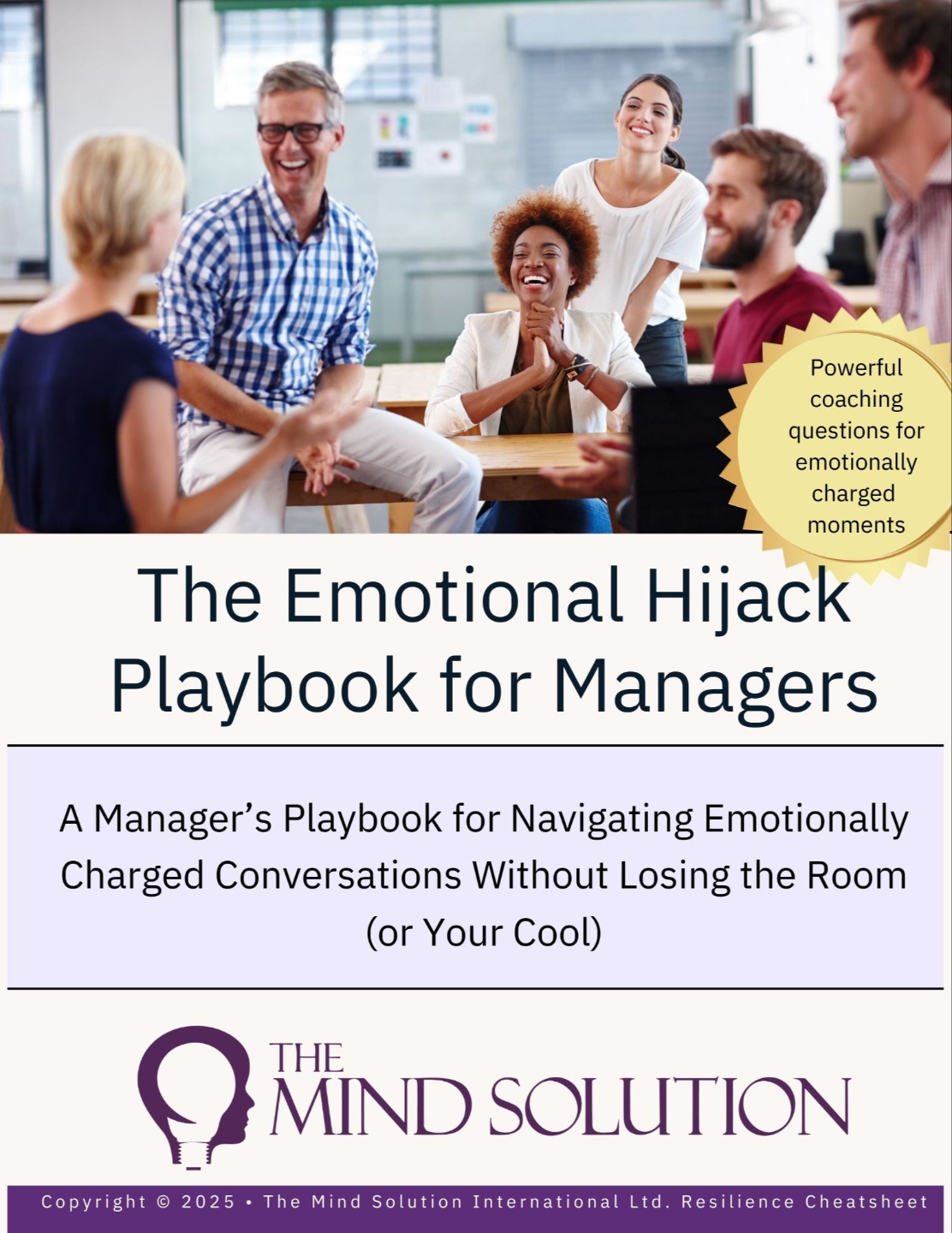Why Emotional Intelligence Training for Leaders Matters More Than Ever
Sep 24, 2024
To Create a Thriving Workforce, Emotional Intelligence Training Needs to be a High Priority
Emotional intelligence training for leaders isn’t a luxury; it’s the foundation of conscious, high-impact leadership. Here’s what real transformation looks like.
The concept of emotional intelligence training for leaders isn’t new in the corporate world. Over a decade ago, when I was working in human resources, there was a clear understanding that leaders needed to demonstrate a certain level of emotional intelligence in the workplace.
However, having spent years working with the human psyche and having had front-row seats into the minds of countless employees, I believe there’s more to emotional intelligence training than teaching leaders to 'name their emotions'.
What Is an Emotion?
To understand why emotional intelligence training for leaders often falls short, we need to understand what an emotion truly is.
Emotions arise from chemical reactions in the body that are triggered by thoughts. These emotions are closely tied to memories, so when you experience an event – whether it’s a quick two-minute conversation or something more significant, like hearing about a potential restructure at work – your brain captures that memory, and your body stores the emotional signature of the event. Your brain becomes a record of the past.
Here’s where the disconnect happens: most people believe that their emotional experiences are coming from external sources. They think their stress, frustration, or happiness stems from their job, their manager, or their workload. But the truth is, your emotional experience is internally generated. It’s a perceptual reality carried inside your neurophysiology.
The Role of Thoughts in Emotional Intelligence
You can’t experience an emotion without first having a thought. Whether you’re aware of the thought or not, it’s there. Emotions are the byproduct of your thinking. What you feel emotionally does not come directly from your external environment. It comes from your internal processing of that environment.
Until leaders understand this foundational truth, emotional intelligence training will only take them so far.
To create real impact and transformation, leaders need to deeply understand what is truly creating their experience. That’s where true emotional transformation begins.
Conditioning and Emotional Self-Awareness
When we repeatedly think the same thoughts, we trigger the same emotions. This conditioning leads the body to become familiar with – and sometimes addicted to – specific emotional states like frustration, anger, or stress. These feelings are the body’s way of signalling where our attention is focused.
This is where self-awareness comes into play. And let me be clear: self-awareness is not a one-time achievement. It’s a continuous journey. There’s a distinct difference between self-awareness and consciousness, but the two dance together.
It’s not enough to attend a two-day emotional intelligence training session and expect to achieve lasting self-awareness. Instead, leaders need consistent reflection on how they’re showing up in their work and life. Where is their attention focused? What do they make situations mean? What are their belief structures?
Breaking the Cycle of Emotional Addiction
What many people don’t realise is that we can become addicted to emotions, even negative ones like stress or fear. I know this sounds paradoxical, but these emotional addictions can trap us in the past, making it difficult to create new experiences. This emotional conditioning makes it hard for leaders to embody true emotional intelligence in leadership.
We aren’t reacting to what’s happening in the moment; we’re responding to familiar emotional patterns rooted in past experiences. If leaders haven’t taken the time to clear out emotional clutter and unresolved trauma, they’ll only reach a limited level of emotional intelligence.
Emotional Intelligence: A Spectrum, Not a Binary
Here’s the thing: emotional intelligence isn’t a "yes" or "no" concept. It’s not as simple as "do you have it or not?" Emotional intelligence, like consciousness, exists on a spectrum. There are times when leaders feel grounded, calm, and present – when they can listen openly and respond thoughtfully. But there are also times when stress, overwhelm, or personal issues cause them to react defensively, tune out, or snap at others.
That’s why emotional intelligence training for leaders needs to go deeper than teaching leaders to name their emotions or how to deal with difficult situations. While those tools are helpful, they’re not enough. To foster true emotional intelligence, leaders need to understand the deeper psychology and neuroscience behind their emotions.
Returning to Our Natural State of Emotional Intelligence
Emotions like peace of mind, contentment, joy, and happiness are our natural state. The key to emotional intelligence in leadership is recognising what pulls us away from this state. And the answer is simple: it’s always our thoughts.
On any given day, we have roughly 60,000 thoughts – and 90% of those are habitual. Developing self-awareness means identifying and breaking those habitual thought patterns. Most people spend their days trapped in their heads, unaware of the thoughts driving their emotions.
A Journey Into Deeper Emotional Intelligence
In my view, emotional intelligence training should take leaders on a deep, introspective journey. It’s not just about learning a few techniques to soothe your autonomic nervous system. That’s not enough. To truly embody emotional intelligence, leaders must be willing to look inward. This isn’t always a comfortable process. It’s not easy to examine why we show up the way we do.
Leaders who have never engaged in this level of self-reflection, who operate mostly from the ego, won’t achieve lasting transformation from a short training session. They may learn a few strategies, but it won’t create the deep, meaningful change that drives impact.
The Real ROI: Self-Aware Leadership
The organisations I’ve worked with that invest in emotional intelligence training for leaders aren’t just building better managers, they’re cultivating more conscious cultures.
Self-aware leaders create teams that feel safe, heard, and empowered. And when people feel safe, they perform better. They collaborate more easily. They innovate more freely. They stay longer.
A Final Word—and a Bold Invitation
If you want your leadership team to go beyond the surface and into true transformation, it starts with emotional intelligence training that’s rooted in neuroscience, psychology, and presence.
This is the work we love. And if you're ready to help your leaders lead from a place of presence, power, and self-awareness, let’s talk.
Ready to bring emotionally intelligent leadership into your organisation?
Book a call today and discover how our emotional intelligence training for leaders can ignite lasting change.
The Emotional Hijack Playbook For Managers
A Manager’s Free Resource for Navigating Emotionally Charged Conversations Without Losing the Room (or Your Cool).
Perfect to use in your next one-to-one.







